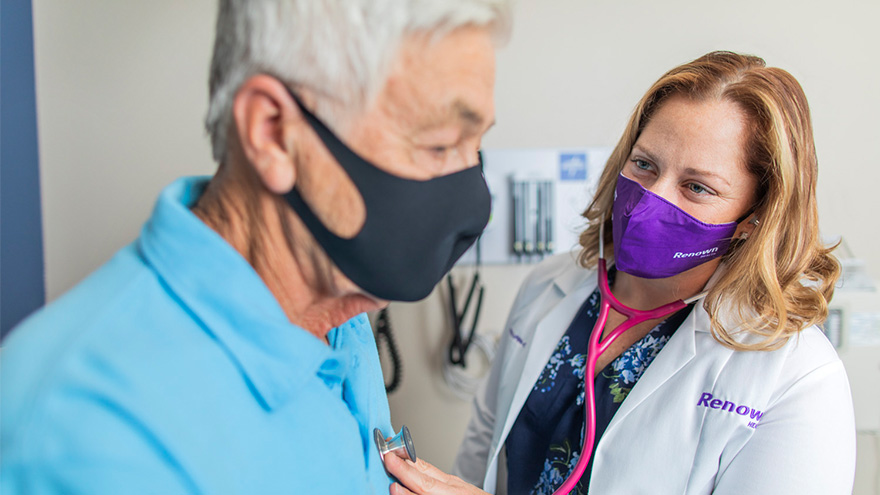Buscar
-
Primary Care vs. Urgent Care vs. The ER
When seeking medical care, there are several different provider types and options from which to choose. For example, you may have asked yourself a common question: Should I go to my primary care provider, urgent care or the emergency room? Sarah Herbert, APRN with Renown Medical Group – South Carson, provides guidelines to help you easily make this decision. When should you go to the Emergency Room (ER)? Making a visit to the ER should be reserved for severe symptoms and/or life-threatening conditions, including: Chest pain Severe shortness of breath or difficulty breathing Weakness or numbness on one side Slurred speech Fainting/loss of consciousness Continuous bleeding or major open wounds Severe allergic reactions Coughing or throwing up blood Drug or alcohol overdose Sharp pain in lower abdomen Severe dehydration and not responding to nausea medication (needing IV fluids) High fever that does not get better with medicine Serious burns Broken bones/dislocated joints Head trauma Find an Emergency Department Near You If you’re still unsure of where to go for appropriate medical care, it’s best to check with your primary care physician. And remember, for a life-threatening emergency, call 9-1-1 immediately!
-
Make Hydration a Priority for Your Health
As the temperatures skyrocket and we return to more outdoor activity, one thing is certain: you must hydrate to stay cool, healthy, and functional. But how much water do you need, and what are some easy ways to ensure you are getting enough? Aurosis Reddy, DO a family medicine provider with Renown Medical Group, shares what you need to know. How Much Water Is Enough? Experts agree that recommended daily water intake can vary depending on different factors such as your weight, metabolism, location, diet, physical activity, and health. As a rule of thumb, women should aim for a daily fluid intake of 91 ounces, and men should aim for 125 ounces. It is important to listen to your body and recognize when you might need to increase your water intake. For example, if you’re partaking in strenuous exercise, or spending time outside in the heat, you’ll want to give your body more water and electrolytes to function properly. How Can I Tell If I Am Dehydrated? Decreased coordination Fatigue Less urination Dizziness Dry, sticky lips and mouth Increased thirst Headache
-
How to Navigate the Baby Formula Shortage
With the ongoing baby formula shortage in the United States, many parents are questioning how they can safely feed their babies and keep them healthy. Pediatrician Karen Wagner, APRN with Renown Medical Group answers some questions on what to do (and not to do) during this challenging time. What if I cannot find my baby’s formula in any stores or online retailers? If you run out of the formula you give your baby and are unable to find it through any trusted retailers, you should start by calling your baby’s pediatrician for recommendations on other safe feeding alternatives. Many pediatricians are advising that, as long as your baby has no special diet or medical needs, they can be switched to a different kind of FDA approved baby formula, if it’s purchased from a well-recognized distributor and not through an auction site or an individual you don’t know. It’s also important to make sure the formula is not expired, as it may no longer be safe or have the correct levels of nutrients. Can I make my own baby formula? Or can I dilute the formula I have? No, it is very dangerous to attempt making your own formula, as it can lead to infection and will not have the right amount of nutrients your baby needs to develop and grow. It’s also unsafe to dilute your formula supply, as doing so will cause a lack of nutrients which can lead to your baby having severe health issues down the road.
-
When Is It Time to See a Physiatrist
Physiatry (fi-zahy-uh-tree), also referred to as physical medicine and rehabilitation, encompasses the diagnosis, prevention and treatment of disabilities or injuries related to the brain, nerves, bones and muscles. The goal of this specialty is to maximize physical functioning, greatly decrease or eliminate pain, foster independence and improve quality of life for those suffering with a disability, chronic pain and physical impairments. Who Is It for? Physiatry can help patients with functional deficits and secondary medical conditions as a result of the following: Amputation Brain Injury Osteoarthritis Spasticity and Movement Disorders Spinal Cord Injury Spine Pain Sports-Related Injuries Stroke Some of these medical conditions can often cause chronic pain or impede physical functioning, ultimately affecting a person’s overall well-being and making it difficult for them to sustain a desired quality of life.
-
¿Son necesarios los lentes con filtro de luz azul?
Since the COVID-19 pandemic, more people are working from home than ever before, leading to a rise in digital screen time. Between spending eight or more hours staring at a computer screen, and some downtime hours spent looking at a smartphone or watching TV, it’s almost inevitable to feel some adverse effects at the end of a day. Blue Light Effects vs. Digital Eye Strain Blue light is all around us, and the most natural source comes primarily from sunlight. Other forms of blue light are artificial and emitted by digital screens including LED TVs, smartphones, tablets and computers. Surprisingly enough, research shows blue light can actually have health benefits such as promoting alertness, boosting memory and cognitive function, elevating mood and regulating circadian rhythm. However, studies indicate that an excess in blue light exposure can lead to depletion of melatonin production, a hormone that regulates our sleep cycles. In today’s eyewear industry, blue light glasses are one of the more popular items purchased by consumers. Companies who sell the glasses claim they help with reducing or eliminating digital eye strain, while also increasing natural melatonin secretion to get a good night’s sleep. Other than their slight yellow tint to filter out blue light, they mostly look like regular glasses and come in many different stylish frames. You can find blue light glasses through various eyewear retailers. Most adults have experienced digital eye strain. Common symptoms of digital eye strain include headaches, blurred vision, irritated eyes, and fatigue. Many believe that digital eye strain is caused by overexposure to blue light, but medical vision experts say that is not the case. “Digital eye strain is related to how we use our digital devices, not the blue light coming out of them,” says Mitchell Strominger, MD, a neuro and pediatric ophthalmologist with Renown Health. Do Blue Light Glasses Even Work? Since blue light glasses aren’t medically proven to help with digital eye strain, you’re probably wondering if they’re even worth using. “If you’re one to binge a TV show or scroll though social media before bedtime, the blue light from those digital screens can disrupt your circadian rhythm and cause you to lose sleep, which can ultimately lead to other adverse health effects,” says Dr. Strominger. “While more research is still needed, some studies have shown that blue light glasses may prevent melatonin suppression and increase quality of sleep. There is no harm in trying them out and seeing if they work for you.” As for preventing digital eye strain, Dr. Strominger shared several helpful tips: Try using the 20-20-20 rule, which entails looking away from your screen and looking at an object 20 feet away for at least 20 seconds. Sit at an arm’s length (about 25 inches) away from your screen. Adjust the brightness and contrast of your screen, especially before bedtime. There is a night mode setting on most smart phones you can use. Reduce your screen time whenever you can and give your eyes a break.
-
Apoyo a la salud de la comunidad LGBTQ+: por qué es importante
Renown Health has long supported northern Nevada’s LGBTQ+ community Pride events with sponsorship, and we’ve collaborated with local and regional LGBTQ+ organizations as an ally. Renown’s Pride Committee works to deepen and broaden our external and internal efforts around LGBTQ+ community engagement, advocacy, and healthcare issues related to sexual and gender minorities, which is part of the greater Diversity, Equity and Inclusion efforts Renown is undertaking. According to Harvard Chan School, data shows that nearly a sixth of LGBTQ+ adults feel they were discriminated against based on their sexual orientation and gender identity. As a result, this brings to light the important need for education within the healthcare setting. Renown Health is bridging the gap for our LGBTQ+ population, and we know more work needs to take place in order to become an inclusive organization. Below are a few ways we’re working on improving our response to LGBTQ+ needs, and celebrate, respect and honor our diversity by being inclusive. Diversity, Equity and Inclusion The Diversity, Equity and Inclusion subcommittee was formed to heighten the awareness and develop a plan on how to better serve all of our diverse populations, including our LGBTQ+ patients. As the largest healthcare provider in northern Nevada, we knew that we could do a better job. The subcommittee provides us a forum to discuss ideas and develop plans to provide better care to these populations. Updated Medical Records with Preferred Name and Pronouns Of course healthcare is personal. We meet patients at their most vulnerable states. And relating to every person by the correct pronoun shows we respect their gender identity. A new medical records update supports our doctors, nurses and care team in capturing this vital information. We are now able to capture every person’s preferred name, sex and sexual orientation to better care for them. Kathleen Zaski BSN, RN, Manager of Clinical Informatics and IT Applications at Renown explains why this is so important. “Your name and identity are core to who you are as a person, and here at Renown, we aim to take care of you as a whole person and to provide the highest level of quality care to our community – all while ensuring the experience is exceptional and tailored to the individual. In other words, having the patient’s preferred name and pronoun in the medical record is important to validate their identity, and show we care, in an already high stress environment. Specifically, giving our providers easy access to the patients preferred name and pronoun in the medical record, allows them to properly address their health concerns. This also helps the health care provider foster a closer relationship with the patient. Studies have found this actually increases the quality of care by creating a more open and comfortable environment.” Gender Neutral Restrooms Mitch Harper, Senior Program Development Manager at Renown, recognizes there’s still so much more to improve upon in becoming an inclusive organization. “At the end of the day, it’s about creating a safe and welcoming environment for our community and our employees. Access to basic human services shouldn’t be contingent on an individual’s skin color, ethnicity, sex, gender identity, sexual orientation, age, disability, or beliefs. Ensuring that private restrooms are equally available to everyone on our campus is just one way we can provide a more inclusive, caring space for the people we serve.” Updated restroom locations: Roseview Tower: 10 Sierra Tower: 14 Tahoe Tower: 14 Helping to Lead and Influence Change Sean Savoy, Manager of Spiritual Care at Renown "The foundation of spiritual care is compassion – being with people in need by caring, supporting, and showing empathy, and promoting a sense of well-being. Being a member of the LGBTQ+ community informs that deep sense of compassion and empathy in a very special and unique way. Our human value, social validity, the very reality of who and what we are, even our right to exist, love and just be, are often called into question. This, in turn, can cause many of us to question ourselves and wonder about our self-worth. This experience should engender compassion and empathy so that we can better recognize, listen to and meet others’ needs to help them achieve inner peace, explore coping strategies to overcome obstacles during illness or crisis, and even find new balance by re-conceptualizing themselves in the context of health and illness. I have found that the intersectionality of my gay and spiritual selves has been a blessing in my life." Matthew Maloy, Team Lead Applications Specialist at Renown “I am a Team Lead Epic analyst in the IT department that is responsible for clinical based workflows for ED, Trauma, and Critical Care and have worked at Renown for 15 years. Being a part of the LGBTQ+ community influences my daily work by ensuring the Electronic Health Record reflects best practices such as giving clinicians the ability to document a preferred name, and displaying that throughout the medical record for consistency. Having the ability to influence decisions that move our community toward human value for all of us is a priority in my daily work.” Our Mission Renown Health’s mission is to make a genuine difference in the health and well-being of the people and communities we serve, including the LGBTQ+ community. We continue to build relationships to improve care, fostering better health outcomes for ALL of our patients by creating a more inclusive health system.
Read More About Supporting LGBTQ+ Community Health – Why it Matters





